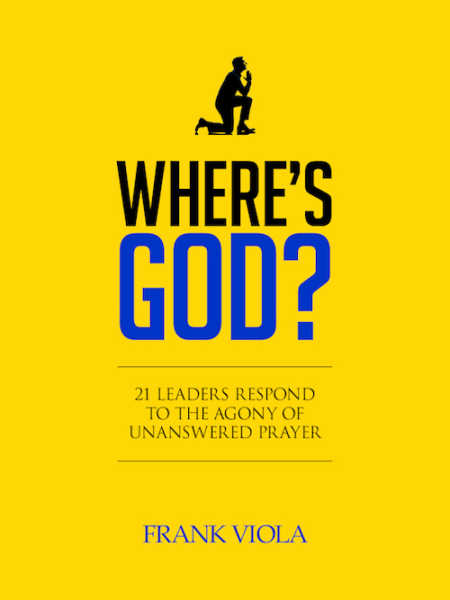We run our website the way we wished the whole internet worked: we provide high quality original content with no ads. We are funded solely by your direct support. Please consider supporting this project.

When Prayers Go Unanswered
Recently Frank Viola published a free e-book where 21 Christian leaders responded to the following question: Why is it that God doesn’t often answer the desperate prayers of His people for deliverance, protection, healing, etc.?
You can download the free ebook by clicking here.
The following excerpt is Greg’s contribution to this book:
_____________________
Two very ill children are prayed for. The first is miraculously healed while the second tragically dies. We understandably want to know why.
Many would claim that this is because God, for some mysterious reason, willed the first to be healed and the second to die. Others would claim that God willed both children to be healed, but the people praying for the second child lacked the faith to receive it. I would contend that both options run into biblical problems, and I know from experience, as do many others, that both sometimes have catastrophic practical consequences.
But are these the only two options?
In Daniel 10, we find God immediately responding to a prayer of Daniel by dispatching an angel to deliver a message. Yet, it took twenty-one days for the message to be delivered (v.13).
Now, suppose we knew nothing more about this episode and asked the question of why it took twenty-one days for God to answer Daniel’s prayer.
Some would answer that God, for some mysterious reason, simply willed His answer to take this long to reach Daniel. Others would answer that Daniel must have lacked sufficient faith to receive the answer until the twenty-first day.
Both would be wrong. The reason for the delay had nothing to do either with God’s will or the strength of Daniel’s faith. The angel rather, explained to Daniel that a principality and power over Persia resisted him for this period of time, and it wasn’t until Michael the archangel got freed up to help him get God’s message through (v.13).
From this episode (and a host of other Scriptures), I believe we should learn that God’s will and our faith are not the only two variables that affect the outcome of prayer. The world is far more complex than that!
God decided to populate this world with human and angelic free agents, and as the “Prince of Persia” demonstrated in Daniel 10, this gives us a degree of “say so” to affect what comes to pass – even at times, to the point of interfering with God’s will.
In fact, every decision free agents make to some degree affects what comes to pass in the present and future, including sometimes, the “if,” “how” and “when” a prayer gets answered.
So think about this. This means that, to understand why any event unfolded the exact way it did, we would have to know every single human and/or angelic decision ever made that influenced the event unfolding the precise way it did. And this applies as much to the question of why God’s response to our prayer unfolded the way it did as it does to why any other event unfolded the way it did.
Since we obviously can’t begin to know the innumerable past free decisions that lead up to any given present event, we must accept that. Unless God reveals it to us, we simply cannot ever answer the question of why.
Yet, it’s vitally important we realize that the reason the why question is unanswerable is not because God’s will and character are mysterious, for these are clearly revealed in Jesus Christ. Rather, “why” questions are unanswerable because the world is infinitely more complex than our little brains can handle.
When faced with the question of why prayer saved one child but not another, I encourage you to not blame God or the victims by assigning the child’s death either to God’s will or to someone’s lack of faith.
Let’s rather openly acknowledge that we simply do not know. But in acknowledging our ignorance, let’s celebrate the one thing we do know: namely, that God is as good and beautiful as He is revealed to be in Christ.
Category: General
Tags: Evil, Frank Viola, Prayer, Problem of Evil, Spiritual Warfare, Suffering
Topics: The Problem of Evil
Related Reading

Hearing and Responding to God: Part 4
Are you inadvertently appealing to magic when you listen for God’s voice? Greg continues his series on hearing and responding to God by pointing out the difference between communion with God and Christian magic. You can view the previous videos here and here and here.

Why Can’t I Feel God?
Question: Greg, you’re always talking about how we need to keep our eyes fixed on the cross to see and experience God’s love for us. But I find myself arguing with God, asking him: “How am I to believe that you love us that much when you don’t love me enough to lift the veil…

Storming the Gates of Hell
Jesus said: “I will build my church, and the gates of Hades will not prevail against it.” (Mt 16:18) To understand Jesus’ teaching here, there are a few things you should know. First, “Hades” was the standard term for the underworld, which means that Jesus was probably referring to the whole of the Satanic kingdom.…

In the Face of Blueprint Words
Many of you know Jessica Kelley through the posts we’ve featured about her on the ReKnew site. She is someone we’ve come to love very much. Jessica lost her five year old son Henry to cancer and has since begun writing a book about her journey. We can’t wait until it’s published. While Greg has…

Supported by God
Here’s an exercise that has helped me experience God’s closeness and helped me feel “at home” regardless of my circumstances. It involves using the incredible gift of your physical body to help you remember God’s ever-present love and care for you. Think for a moment about the way God designed the world and the laws…

Our Beautiful, Nightmarish World
The Bible consistently proclaims that the creation reflects the glory of God. To me, the truth of this proclamation is undeniable. When I was younger I several times went on three-week solo backpacking trips into the mountainous forests of Montana. If gazing at the star studded sky on a moonless night at the peak of…
